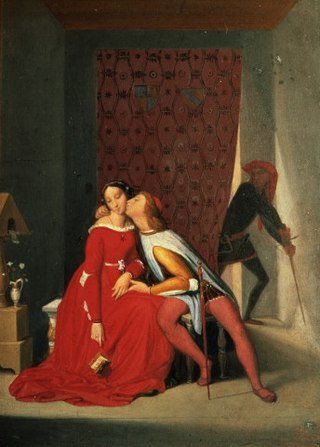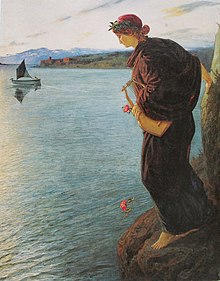Love encompasses a range of strong and positive emotional and mental states, from the most sublime virtue or good habit, the deepest interpersonal affection, to the simplest pleasure. An example of this range of meanings is that the love of a mother differs from the love of a spouse, which differs from the love for food. Most commonly, love refers to a feeling of strong attraction and emotional attachment.

Melancholia or melancholy is a concept found throughout ancient, medieval, and premodern medicine in Europe that describes a condition characterized by markedly depressed mood, bodily complaints, and sometimes hallucinations and delusions.

A torch is a stick with combustible material at one end which can be used as a light source or to set something on fire. Torches have been used throughout history, and are still used in processions, symbolic and religious events, and in juggling entertainment. In some countries, notably the United Kingdom and Australia, "torch" in modern usage is also the term for a battery-operated portable light.

William Butler Yeats was an Irish poet, dramatist and writer, and one of the foremost figures of 20th-century literature. He was a driving force behind the Irish Literary Revival, and along with Lady Gregory founded the Abbey Theatre, serving as its chief during its early years. He was awarded the 1923 Nobel Prize in Literature, and later served two terms as a Senator of the Irish Free State.
Acmeism, or the Guild of Poets, was a modernist transient poetic school, which emerged c. 1911 or in 1912 in Russia under the leadership of Nikolay Gumilev and Sergei Gorodetsky. Their ideals were compactness of form and clarity of expression. The term was coined after the Greek word άκμη (ákmē), i.e., "the best age of man".

Limerence is a state of mind which results from romantic feelings for another person, and typically includes intrusive, melancholic thoughts, or tragic concerns for the object of one's affection as well as a desire to form or maintain a relationship with the object of love and to have one's feelings reciprocated.

A love triangle is a scenario or circumstance, usually depicted as a rivalry, in which two people are pursuing or involved in a romantic relationship with one person, or in which one person in a romantic relationship with someone is simultaneously pursuing or involved in a romantic relationship with someone else. A love triangle typically is not conceived of as a situation in which one person loves a second person, who loves a third person, who loves the first person, or variations thereof.

Romance or romantic love is a feeling of love for, or a strong attraction towards another person, and the courtship behaviors undertaken by an individual to express those overall feelings and resultant emotions.

Bibliophilia or bibliophilism is the love of books. A bibliophile or bookworm is an individual who loves and frequently reads or collects books.

Infatuation or being smitten is the state of being carried away by an unreasoned passion, usually towards another person for whom one has developed strong romantic feelings. Psychologist Frank D. Cox says that infatuation can be distinguished from romantic love only when looking back on a particular case of being attracted to a person. Infatuation may also develop into a mature love. Goldstein and Brandon describe infatuation as the first stage of a relationship before developing into a mature intimacy. Whereas love is "a warm attachment, enthusiasm, or devotion to another person", infatuation is "a feeling of foolish or obsessively strong love for, admiration for, or interest in someone or something", a shallower "honeymoon phase" in a relationship. Dr. Ian Kerner, a sex therapist, states that infatuation usually occurs at the start of relationships, is "...usually marked by a sense of excitement and euphoria, and it's often accompanied by lust and a feeling of newness and rapid expansion with a person". Phillips describes how the illusions of infatuations inevitably lead to disappointment when learning the truth about a lover. Adolescents often make people an object of extravagant, short-lived passion or temporary love.
The triangular theory of love is a theory of love developed by Robert Sternberg. In the context of interpersonal relationships, "the three components of love, according to the triangular theory, are an intimacy component, a passion component, and a commitment component."
Lysis, is a dialogue of Plato which discusses the nature of philia, often translated as friendship, while the word's original content was of a much larger and more intimate bond. It is generally classified as an early dialogue.

Modernist literature, originated in the late 19th and early 20th centuries, and is characterised by a self-conscious separation from traditional ways of writing in both poetry and prose fiction writing. Modernism experimented with literary form and expression, as exemplified by Ezra Pound's maxim to "Make it new." This literary movement was driven by a conscious desire to overturn traditional modes of representation and express the new sensibilities of the time. The immense human costs of the First World War saw the prevailing assumptions about society reassessed, and much modernist writing engages with the technological advances and societal changes of modernity moving into the 20th century. In Modernist Literature, Mary Ann Gillies notes that these literary themes share the "centrality of a conscious break with the past", one that "emerges as a complex response across continents and disciplines to a changing world".

Roy Frederick Baumeister is an American social psychologist who is known for his work on the self, social rejection, belongingness, sexuality and sex differences, self-control, self-esteem, self-defeating behaviors, motivation, aggression, consciousness, and free will.
Mind games are actions performed for reasons of psychological one-upmanship, often employing passive–aggressive behavior to specifically demoralize or dis-empower the thinking subject, making the aggressor look superior. It also describes the unconscious games played by people engaged in ulterior transactions of which they are not fully aware, and which transactional analysis considers to form a central element of social life all over the world.
Remedia Amoris [c. 2 AD] is an 814-line poem in Latin by Roman poet Ovid.
Love and hate as co-existing forces have been thoroughly explored within the literature of psychoanalysis, building on awareness of their co-existence in Western culture reaching back to the “odi et amo” of Catullus, and Plato's Symposium.

"I travelled among unknown men" is a love poem completed in April 1801 by the English poet William Wordsworth and originally intended for the Lyrical Ballads anthology, but it was first published in Poems, in Two Volumes in 1807. The third poem of Wordsworth's "Lucy series", "I travelled..." was composed after the poet had spent time living in Germany in 1798. Due to acute homesickness, the lyrics promise that once returned to England, he will never live abroad again. The poet states he now loves England "more and more". Wordsworth realizes that he did not know how much he loved England until he lived abroad and uses this insight as an analogy to understand his unrequited feelings for his beloved, Lucy.

Olivia Shakespear was a British novelist, playwright, and patron of the arts. She wrote six books that are described as "marriage problem" novels. Her works sold poorly, sometimes only a few hundred copies. Her last novel, Uncle Hilary, is considered her magnum opus. She wrote two plays in collaboration with Florence Farr.
The Gift of Harun Al-Raschid, written in 1923, is a poem by the Irish poet William Butler Yeats, first published in 1924 in the American journal The Dial in a collection of The Cat and the Moon and Certain Poems. The poem was then published in his prose book A Vision in 1925 and was included in Yeats's collection of The Tower, which was published in 1928.
















